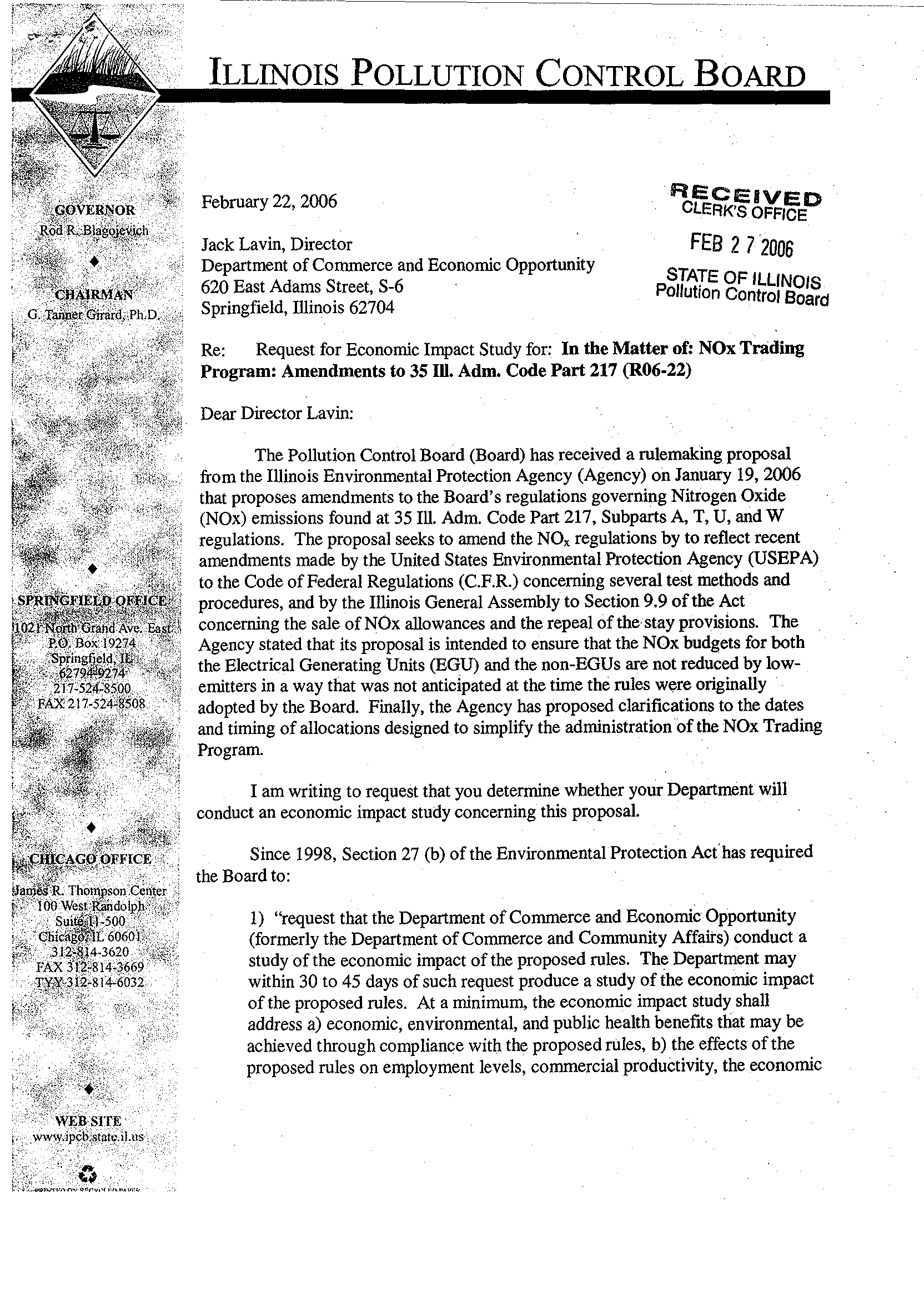.c
OR'
Chard 'PhD .
rd
0.
Box 19274
prmgf
eld
79
217 5
y
T1
Y
314-814-6032
'WEB-SITE.
.
www;ipebstatc .ii
us,
CACQ OFF ICE
.r„
Thontpson'.Center
ti
100 WestRandolp
_,
,
1-1-500
.
> 606o'i
.
.3I2-$14-3620 §
X:312.814-3669`.
ILLINOIS POLLUTION CONTROL BOARD
February 22, 2006
Jack Lavin, Director
Department of Commerce and Economic Opportunity
620 East Adams Street, S-6
Springfield, Illinois 62704
RECEIVED
CLERK'S OFFICE
FEB 2
7'2006
Pollution Control
Board
Re
:
Request for Economic Impact Study for : In the Matter of: NOx Trading
Program: Amendments to 35 III. Adm. Code Part 217 (R06-22)
Dear Director Lavin:
The Pollution Control Board (Board) has received a rulemaking proposal
from the Illinois Environmental Protection Agency (Agency) on January 19, 2006
that proposes amendments to the Board's regulations governing Nitrogen Oxide
(NOx) emissions found at 35 Ill. Adm. Code Part 217, Subparts A, T, U, and W
regulations. The proposal seeks to amend the NO, regulations by to reflect recent
amendments made by the United States Environmental Protection Agency (USEPA)
to the Code of Federal Regulations (C.F.R.) concerning several test methods and
procedures, and by the Illinois General Assembly to Section 9.9 of the Act
concerning the sale of NOx allowances and the repeal of the stay provisions . The
Agency stated that its proposal is intended to ensure that the NOx budgets for both
the Electrical Generating Units (EGU) and the non-EGUs are not reduced by low-
emitters in a way that was not anticipated at the time the rules were originally
adopted by the Board. Finally, the Agency has proposed clarifications to the dates
and timing of allocations designed to simplify the administration of the NOx Trading
Program.
I am writing to request that you determine whether your Department will
conduct an economic impact study concerning this proposal .
Since 1998, Section 27 (b) of the Environmental Protection Act has required
the Board to
:
1) "request that the Department of Commerce and Economic Opportunity
(formerly the Department of Commerce and Community Affairs) conduct a
study of the economic impact of the proposed rules . The Department may
within 30 to 45 days of such request produce a study of the economic impact
of the proposed rules. At a minimum, the economic impact study shall
address a) economic, environmental, and public health benefits that may be
achieved through compliance with the proposed rules, b) the effects of the
proposed rules on employment levels, commercial productivity, the economic
growth of small businesses with 100 or less employees, and the State's
overall economy, and c) the cost per unit of pollution reduced and the
variability of company revenues expected to be used to implement the
proposed rules; and
(2) conduct at least one public hearing on the economic impact of those
rules. At least 20 days before the hearing, the Board shall notify the public of
the hearing and make the economic impact study, or the Department of
Commerce and Economic Opportunity's explanation for not producing an
economic impact study, available to the public . Such public hearing may be
held simultaneously or as a part of any Board hearing considering such new
rules." 415 ILCS 5/27(b) (2004) .
The Board is currently in the process of scheduling hearings in this matter . I
would greatly appreciate a response from you concerning DCEO's position on
whether it will perform the economic impact study. If I, or my staff, can provide you
with any additional information, please let me know . While the Board can proceed
to hold hearings while awaiting your decision, the Environmental Protection Act
does not allow the Board to complete its rulemaking process without your
Department's input.
Thank you for your early response
.
Sincerely,
G. Tanner Girard
Acting Chairman, Pollution Control Board
Cc: Dorothy M. Gunn, Clerk
Erin Conley, Rules Coordinator
